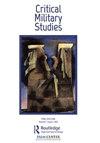Naming, but not shaming: the war names phenomenon, 1914-1920
Q1 Arts and Humanities
引用次数: 0
Abstract
ABSTRACT Between 1914 and 1920, over 1600 children were given first names of key battles, geographical locations throughout the fronts of the FWW and key military personnel. Hundreds more were given war-related first and second middle names in the same time period. This article explores the geographical and social patterns of this naming trend. Whilst a number of the children covered by this research had a close connection to an individual (usually a man) in service, the piece also explores the anomaly of the use of Verdun as a name, which proved particularly popular in South Wales. It also explores public discourse about the war names trend through an examination of newspaper commentary asking what this reveals about popular attitudes to the conflict and its impact on family life.命名,但不是羞辱:1914-1920年的战争命名现象
摘要1914年至1920年间,1600多名儿童被赋予了关键战役、FWW前线地理位置和关键军事人员的名字。在同一时期,还有数百人被赋予了与战争有关的第一和第二中间名。本文探讨了这种命名趋势的地理和社会模式。虽然这项研究涵盖的许多儿童与服役的个人(通常是男性)有着密切的联系,但这篇文章也探讨了使用凡尔登作为名字的反常现象,事实证明,凡尔登在南威尔士特别流行。它还通过审查报纸评论,探讨了公众对战争名称趋势的讨论,询问这揭示了公众对冲突的态度及其对家庭生活的影响。
本文章由计算机程序翻译,如有差异,请以英文原文为准。
求助全文
约1分钟内获得全文
求助全文
来源期刊

Critical Military Studies
Arts and Humanities-History
CiteScore
1.90
自引率
0.00%
发文量
20
期刊介绍:
Critical Military Studies provides a rigorous, innovative platform for interdisciplinary debate on the operation of military power. It encourages the interrogation and destabilization of often taken-for-granted categories related to the military, militarism and militarization. It especially welcomes original thinking on contradictions and tensions central to the ways in which military institutions and military power work, how such tensions are reproduced within different societies and geopolitical arenas, and within and beyond academic discourse. Contributions on experiences of militarization among groups and individuals, and in hitherto underexplored, perhaps even seemingly ‘non-military’ settings are also encouraged. All submitted manuscripts are subject to initial appraisal by the Editor, and, if found suitable for further consideration, to double-blind peer review by independent, anonymous expert referees. The Journal also includes a non-peer reviewed section, Encounters, showcasing multidisciplinary forms of critique such as film and photography, and engaging with policy debates and activism.
 求助内容:
求助内容: 应助结果提醒方式:
应助结果提醒方式:


